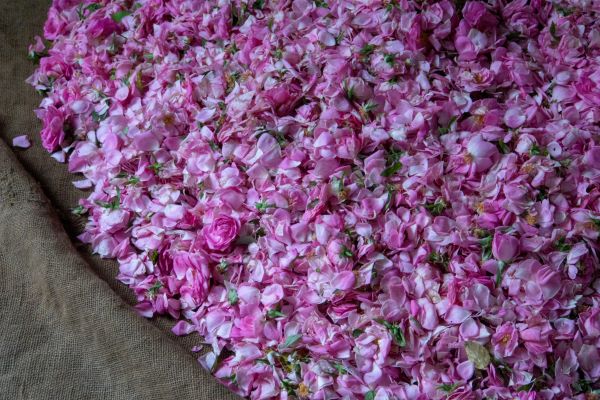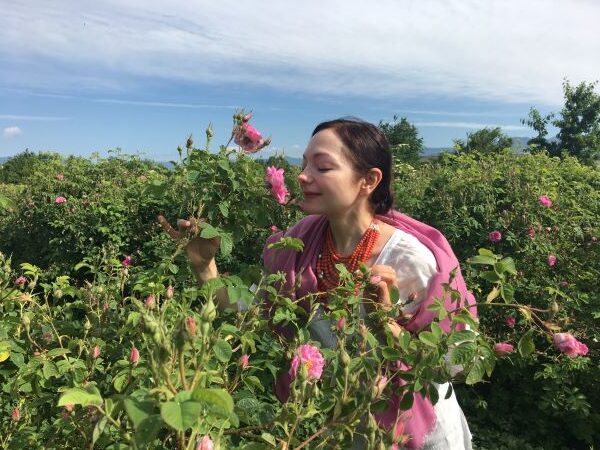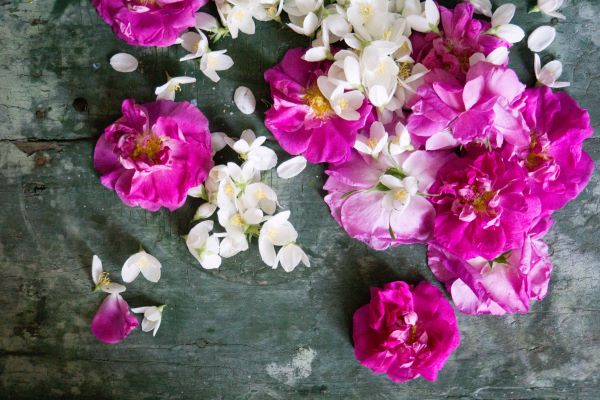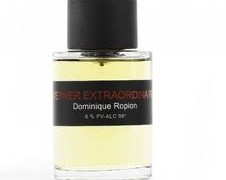The 10th century Persian philosopher and scientist Avicenna is credited with many contributions to astronomy, geography, psychology, logic, mathematics, and physics. He also found time to delve into perfumery and devised methods to extract essential oils, experimenting on roses. If Avicenna were to step into a fragrance lab today, he would orient himself quickly enough–modern perfumery is a curious amalgam of state-of-the-art science and traditional techniques. For instance, rose oil is prepared in much the way as in Avicenna’s time through the process of steam distillation.

Even older than rose oil is rosewater, an ingredient with a history predating Avicenna. Lebanese food writer Barbara Abdeni Massaad, whose award winning cookbook Mouneh explores the traditions of preserving fruit, vegetables and flowers, includes a section on making rosewater. “Yes, the distillates from roses and orange flowers continue to be made in villages,” she commented on the vitality of the tradition. “Older people still believe that homemade is best.”
First, the rose petals are placed in the lower part of an alembic and covered by water. Then, the contraption is sealed with a paste of ashes and flour and cold water is added to the top of the alembic. Heated slowly, the rose petals give off their essential oil and the watery substance (hydrosol) that remains behind after the essence is removed has a rich scent. This is rosewater. It is used to flavor puddings, candies and savory dishes, and in the Middle East a flask of fragrant liquid is offered to guests to freshen up their hands and faces. More than a delicious aromatic, rosewater is also part of a culture and is believed to have medicinal properties.

Givaudan, one of the leading fragrance and flavor companies, offers an ingredient called Rose Natsource® Extract. Some quick research revealed that to obtain it, rosewater is treated one more time to retain the volatile elements, which are then reconstituted into the novel product. In contrast to the heft and richness of essential oil, the rosewater extract smells citrusy and fruity. Avicenna would have found this blend of old and new intriguing.
Givaudan is not the only one in on the act; International Flavors & Fragrances has a material called Rose Water Essential. And so as more companies use modern technology to recast traditional materials, rosewater extracts are finding their way into perfume formulas. They are also significantly less expensive than classical rose oils and absolutes, and even a small amount can add richness–or as the French call it “gras,” fat–to a composition.
One illustration is Arquiste’s Fleur de Louis, which uses a touch of rosewater in its jasmine laced bouquet. Rose is just an accent in this plush blend of night blooming flowers, but its radiance lingers. Layered onto dark woods, the flowers have a baroque opulence, but even in the powdery drydown, they remain bright and clear.

Other fragrances play with the idea of rosewater freshness by contrasting the floral notes with green, leafy accents. Perfumers may use the rosewater extracts in this context or create their own fantasy accords by combining materials that evoke the delicate aroma of rosewater. For instance, Histoires de Parfums’ Vert Pivoine and Cartier’s Eau de Cartier Goutte de Rose take rose into a crisp and cool direction. Eric Buterbaugh Florals’s Sultry Rose adds passion fruit and pepper, with the end result being more coquettish than smoldering, but nevertheless charming.
Massaad recommends adding a splash of rosewater to black coffee, and following her advice I have been enjoying many rose perfumed mornings. Since Avicenna prescribed rosewater to strengthen the heart, it feels like a perfect way to start the day.
Mouneh: Preserving Foods for the Lebanese Pantry by Barbara Abdeni Massaad, winner of the Gourmand Cookbook Award 2010 and Prix de la literature Gastronomique 2010.
Photography by Bois de Jasmin













25 Comments
Debi: It’s quite a coincidence that you should post this article today. I just finished reading the Second Commonwealth by Philip Pullman. A key component of the story is the attempt, by a leading pharma company, to control the supply of ros oil.
I don’t favour too many rose perfumes myself but enjoy a few. Like velvet rose and oud by Jo malone. July 16, 2021 at 9:21am
Dorothy Van Daele: Love Pullman’s Lyra stories. You are right… the rose oil is central, the collapse of a business run by Lyra’s school friend’s family, university traditions, Lyra’s reaction when given a chance to experience it herself, the romantic legend. July 16, 2021 at 10:00am
Debi: Absolutely. I had read golden compass many years ago. Don’t know why I never went on to read the others. Now I just finished the rest of the dark materials.
Very well written. Thoughtful and and provocative. Like the way the characters develop over the years. July 16, 2021 at 11:59am
Victoria: It’s been on my reading list! July 20, 2021 at 3:57am
Debi: Do read it. The entire series is fascinating. He has a way with words and descriptions and world building is superb July 20, 2021 at 4:15am
Matty1649: I enjoy Velvet Rose and Oud by JM as well. Portia recommended it to me when I said on another blog that I sometimes found Oud too strong for me. July 16, 2021 at 9:32am
Debi: I like JM ~ specially the older ones. July 16, 2021 at 12:00pm
Victoria: A beautiful composition. July 20, 2021 at 3:57am
Filomena: Beautiful photos! July 16, 2021 at 1:05pm
Victoria: Thank you very much! July 20, 2021 at 3:57am
Elizabeth Rush: Thanks for another insightful article. I LOVE the smell of roses and can recommend rose flavored tea as another lovely way to start the day. My local tea company, Mark Wendell sells a wonderful Rose Congou
https://marktwendell.com July 16, 2021 at 3:40pm
Victoria: Thank you! I’m going to take a look. July 20, 2021 at 3:58am
Nancy Chan: Very interesting rosewater article, and as usual beautiful photos. I enjoy a spritz of rosewater on my face each morning as part of my skincare routine. My favourite rosewater is by Bulgarian brand, Alteya. The Rosa Alba rosewater has a fruity lychee note to it which makes the scent so beautiful. July 16, 2021 at 4:32pm
Victoria: I do too. I bought a few bottles on my last trip to Bulgaria, so I use rosewater in everything, food, toners, masks. July 20, 2021 at 3:58am
Aurora: You look so happy among the roses. Thank you so much for sharing the information about new techniques to make rose extraction go even further. July 17, 2021 at 1:31am
Victoria: It was a wonderful experience. July 20, 2021 at 3:59am
Zazie: Thank you once again for another interesting article! I have always found the process of capturing fragrance extremely fascinating, and love the fact that tradition and innovation coexist in modern perfumery.
These past couple of years I slowly but surely found a new appreciation for rose themed fragrances – there are still just a few that I enjoy wearing, yet they dominate my perfume wear time. I think they all belong to a same subgenre of the ambery-rose family, despite being very distinct from each other.
They are all very ornate, rich but not heavy, spicy or plummy or both. I’ve recently smelled one rose perfume from the matiere premiere line that may join my small rose collection soon.
But if I stick to rosewater, I must credit one of the most inspiring (for me) articles (or series of articles?) that you wrote on this blog on the use of rose water and orange flower water in food and beverages.
They provided wonderful inspiration and I always think of you whenever I sprinkle rose water over a cup of raspberries, or prepare my own variant of cafe blanc.
Which is why, among many other reasons, I love reading your blog so much 😉 July 17, 2021 at 6:13am
Victoria: Thank you so much! You mean these two articles, right?
https://boisdejasmin.com/2013/02/10-ways-to-use-rosewater-perfume-beauty-food.html
https://boisdejasmin.com/2013/07/10-ways-to-use-orange-blossom-water-perfume-beauty-cooking-recipes.html
Like you, I was lukewarm about heavy rose perfumes at first. However, they evoke such distinctive images and impressions that many roses, even the richest ones, grew on me. July 20, 2021 at 4:02am
OnWingsofSaffron: Thanks for your ever excellent articles! Like the last one on collapsing frankincense supplies—I restrained myself from commenting as it would have ended in a long and bitter diatribe on the short-sighted/blind state of world consumption decimating flora and fauna as if we had a second Earth around the corner!
Back to rose water: One of my weirdest encounters was in Oman. When tasting the plentitude of dates in the town of Nizwa, I by the way asked whether he had local rose water. He grinned, and then dabbed some liquid on my hand.
If you clean a BBQ-grill after cooking lamb chops on it, that‘s what this „rose water“ smelled of. It was awful, and I was taken aback and thought he had pranked me.
Further up in the mountains in a village called Sayq I looked for rose water once more. In a tiny shop I found some, sniffed it, and once again this dirty charcoal smell with a very slight rose scent. Needless to say, a very big disappointment!
Then, in the desert town of Sinaw we stopped at a supermarket for cool drinks and there—from a Westerner‘s point of view in the middle of nowhere—a whole aisle full of rose waters from all over world! I bought a liter of rose water from Kashan in Iran and used it sparingly on my rice dishes!
Yet, strangely, no Omani rose water! July 18, 2021 at 3:41am
Victoria: Oman has a small rose production, but their distillation methods result in a product with a distinctive smoky edge. Perhaps, different, better qualities are exported, but in Oman I wasn’t able to find anything comparable to Kashan’s rosewater. July 20, 2021 at 4:38am
Ewan: THanks for this article. In response I bought a synthetic rose oil and a natural one.
Initial feeling: Synthetic is stronger smelling but lacks subtlety while the natural is not so strong but its subtlety plays more on the mind, its freshness more calming. It seems to play a little game of ‘just out of reach’ – it has a personality July 20, 2021 at 12:16am
Victoria: It also depends on the material itself, whether natural or synthetic. You can also try mixing the two in different proportions and see what result you get. July 20, 2021 at 4:41am
Ewan: Ta for the tip, I’ll give it a go.
I have told a couple of people about your blog as they aren’t just interested in perfumes but also improving their English – one lady said that she was very pleased to learn about this blog.
Thanks again July 20, 2021 at 5:21am
Victoria: Thank you very much! I’m glad that they liked it. July 21, 2021 at 2:12am
Ewan: It’s a pleasure, and recommending your blog also makes me look good too [ obligatory smiley face ] July 21, 2021 at 2:22am